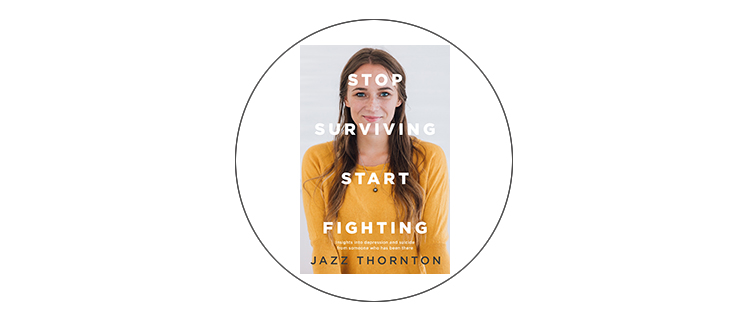Warning: This article deals with the topics of depression, anxiety and suicide.
In the last few years, Jazz Thornton became the youngest New Zealand film director to win the annual Doc Edge pitching contest, was nominated for Young New Zealander of the Year and this year, is a finalist for NZ Local Hero of the Year.
But it wasn’t always accolades and success for the 25-year-old Aucklander. Jazz Thornton has suffered with her mental health for as long as she can remember, with self-harm and suicidal tendencies ramping up for her between the ages of 12 and 20. After battling this for many years and putting in place the people and the processes to help her overcome the battles with her mind, Jazz went on to create Voices of Hope, alongside Genevieve Mora, (you might remember the pair were nominated in the ‘Health, Body & Wellness’ category at the Miss FQ Influence Awards last year) to give hope to other youth who, just like them, might be going through similar struggles.
Jazz has toured around the world, speaking at conventions and sharing her message of hope with everyone from TIME magazine’s documentary series to the Duke and Duchess of Sussex. And now, she has put pen to paper to share her thoughts in the hope that a combination of her own story and the sharing of some practical tools and advice she has picked up along the way will help to guide others through their own journey.
Below is an extract from Jazz’s new book, Stop Surviving Start Fighting, which documents her journey through mental illness – including the point where she decided enough was enough – and began the fight to save herself:
A few weeks after the big conversation with Esther that we started this story with, I remember spending a whole day trying to figure out what it actually meant to fight, to work out how I could overcome the dark battle going on in my mind. While doing so, I came across an article about the process of soldiers going into war. I realised that while the situations were different, the fundamentals of an army battle could transfer to the battle of mental health. This is what I discovered:
PHASES OF AN ARMY BATTLE:
1. Prepare — intelligence-gathering phase.
In army terms, this is all about gathering information on the opponent and the battle that is about to take place. Who were they fighting? What were they fighting for? What are their opponent’s strengths and weaknesses?
In my own case, when gathering intelligence and deciding what it was I was trying to fight, it was important not to confuse the symptoms of the problem with the underlying problem itself.
The underlying problem was not my suicidal behaviour — that was just a symptom. I didn’t have to fight my suicidal tendencies, I had to fight the beliefs that put me in that state. This realisation was what kick-started that core-beliefs list I wrote.
While writing that list I began to untangle another belief, one that told me that my issue was just simply who I was. However, I now knew my illness was not my identity. And if this was not my identity, then maybe I wasn’t fighting against myself, but against incorrect beliefs, behaviours and responses.
This is one of the key things to remember when it comes to engaging in the battle — you have to sit down and figure out what it is you are really fighting.
The ‘intelligence-gathering’ phase for this looks different for everyone, but I found a good place to start was finding stories of people who had overcome the same situations — researching what they learnt, how they got through. For me this meant spending hours finding stories of other people who had fought through mental illness, rather than spending hours binge-watching Netflix! I would literally google ‘how to fight’ and list all the practical things I could do, thinking about what had been stopping me from fighting and how I could push forward. I would read articles on websites like themighty.com and watch documentaries on YouTube about people who had survived mental illness and come out on top.
Don’t mistake this phase for researching your illness, as sometimes this can do more harm than good. I know that for me when I was at one stage diagnosed with Borderline Personality Disorder (BPD) I googled a bunch of stuff and read that there was no cure! This led me to me thinking ‘Well then, there is no point because this is what I will be like forever’ — which obviously was neither true nor helpful! (There are good evidence-based therapies for BPD!) This goes for all kinds of mental illness, though — if you start researching too deep into it you can begin to box yourself in and limit your thinking. Instead, this research is all about how you can fight your thoughts, behaviours and responses. What are the practical things that you can do to begin to engage in the battle?
2. Conduct — initial (combat assault) phase. Also known as the ‘action phase’.
For an army, this phase is the battle itself. The soldiers now know what they are fighting and how to best fight it and now it is time to do the work. It is all well and good to plan, think and talk about change, but the reality is that nothing will change until you actually action that change.
To be honest, I think that I did only the ‘prepare and research’ phase for so long. I would spend hours talking about change and complaining that nothing was happening, but I don’t think I ever actioned the things I was saying. It would be like saying ‘One day I am going to be a sports star’ but then never getting on the field to practise. You can’t think yourself to freedom, you have to action it.
For me personally, ‘conduct’ looked like a few different things. This is where I started to write those core-belief lists, where I started to engage in therapy for the first time (I will talk about this soon) and when I started to wake up every day choosing to engage in this battle and fight back for my life.
This wasn’t easy. I couldn’t tell you how many times I just wanted to quit and go back to my old ways, how many times I would be sitting there tempted to just run away again and hurt myself. I had to start using all of these urges as decision points to engage and put into practice the things I had to do to fight. I had to allow the people around me to support me, and I had to learn to trust that they wouldn’t leave me if I told them the reality of what was going on for me. This meant actually having to reach out when things first came up and not waiting to hit tipping point before I called.
The people around me were incredible. They supported me with a lot of tough love (the kind of love that would say ‘OK, Jazz, I’m so glad you reached out — it’s horrible that you are feeling this way, but you know what you need to do to get yourself out of this’). This is important, because once they knew that I had been learning to fight, they knew that I could get through this, and they empowered me to do so. They didn’t dive in and save me every time; instead, they encouraged me to do the work and to put in place the things I knew I needed to. There were times when they would just embrace me, but a lot of the time they challenged me, not giving me the answers but instead making me find the answers with them walking by my side.
This phase of the battle is vital for the final phase, which is the breakthrough phase.
3. Breakthrough — this phase occurs when the attacking force breaks or penetrates their opponent’s defensive line, and rapidly exploits that gap.
Once you have gathered the intelligence, engaged in the conduct and begun to action your fight, this is when the breakthrough can occur. Retraining your brain to believe that you are worth it may seem like only repetitive words that don’t mean a lot for a while, but eventually it will become truth and one day you will wake up and believe it as fact; it will become a new belief. This isn’t something that happens overnight, but with consistency and reworking your brain patterns you will start to see the difference.
I remember a key moment when I realised that my beliefs were changing; it was a very small but significant thing. I was at church one morning, and Wayne and Libby had been packing stuff out after the service. I was standing in the corridor backstage about to leave and Wayne and Libby both walked past me (they were in work mode!). Usually my mind would have freaked out at that point and I would have wondered what I did wrong and why they didn’t say goodbye — but this time I didn’t. This time I felt fully secure that they were just busy, and them not saying bye had absolutely nothing to do with my worth or their love for me. The months of hard work and core-belief contradiction writing had started to really pay off. I no longer second-guessed my worth based on their response, because I knew for a fact that they loved me.
Engaging in a battle is hard, because often we want to be able to jump straight through to the breakthrough phase. We want to just start living without this illness. But the reality is that it is a process — a process that can feel impossible (trust me, I know how that feels!). I could not tell you how many times I thought to myself that there was no point in trying to change things, or how many times I have heard other people say it. But it is so important that we learn how to engage in this battle for our freedom, despite everything in our life that tells us otherwise — because once we gear up and begin to really fight, change may be closer than we think.

This is an extract from Stop Surviving, Start Fighting by Jazz Thornton. You can purchase the e-book or audio book now from penguin.co.nz – look out for the paperback edition in stores near you, too.
If you or anyone you know needs help, call one of the below:
• Lifeline: 0800 543 354 (available 24/7)
• Suicide Crisis Helpline: 0508 828 865 (0508 TAUTOKO) (available 24/7)
• Youthline: 0800 376 633, email [email protected] or online chat
• Kidsline: 0800 543 754 (available 24/7)
• Youth services: (06) 3555 906
• Whatsup: 0800 942 8787 (1pm to 11pm)
• Women’s Refuge – 0800 733 843 (0800 REFUGE)
• Depression helpline: 0800 111 757 (available 24/7)
• Rainbow Youth: (09) 376 4155
• CASPER Suicide Prevention
If it is an emergency and you feel like you or someone else is at risk, call 111.











